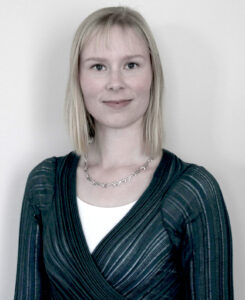30.1.2018
Research shows that young people in Western societies are not affected by the climate issue to any large extent. They think that it does not have any bearing on their living conditions, and they intend to continue living as before.
“My thesis proves that this to a large degree also pertains to young people at Swedish-speaking schools in Finland,” says Mikaela Hermans, who recently graduated as a doctor of education from Åbo Akademi University.
In her doctoral thesis, Hermans studied the attitudes to, and teaching of, climate change among ninth-graders and geography teachers at Finland-Swedish schools. The results show that the teaching does not help pupils to act so as to reduce climate impacts, but is mainly aimed at increasing their understanding of climate change from the perspective of natural sciences.
However, pupils who are interested in environmental issues and have a positive attitude to measures against climate change and to the teaching of it, are more willing to act than other pupils.

Linda Degerman, who has also recently completed her doctorate in education at Åbo Akademi, attained similar results. Degerman shows that pupils in Sweden have better knowledge of climate change than Swedish-speaking pupils in Finland, and that a majority of the Swedish pupils found climate change to be a harmful phenomenon with worrying consequences.
“A small percentage of all pupils, particularly Finland-Swedish boys, were of the opinion that the threat of climate change is exaggerated and that they themselves will not be impacted. Action readiness was equally low in both countries, but girls were clearly more prepared to act than boys,” says Degerman.
“The more interested in environmental questions the pupils were and/or the more they experienced climate change as a threat, the more prepared they were to take measures.”
Teacher’s opinion decisive
Deviations from the scientific perspective on climate change are salient among ninth-graders, but also appear – perhaps more surprisingly – among the geography teachers included in Hermans’ study. A clear willingness to act is not very common.
“Teachers are willing to turn off lights and their computers, but as a rule they’re not prepared to make larger sacrifices or engage in efforts to take on personal responsibilities in relation to the climate issue. On the other hand, this pertains also to the public at large in Finland, as surveys have shown,” says Hermans.
Personal priorities and opinions on climate change among teachers are clearly reflected in their teaching. Teachers with a strong personal standpoint often do more in order to engage their pupils in the climate issue. The group of teachers who do not have personal convictions concerning the climate question often stop at attempting to explain it as a phenomenon in terms of natural science, without actually engaging the pupils. This group of teachers also tend to delegate the responsibility for concrete actions and decisions concerning climate change to others.
Among both pupils and teachers there is often a tendency to belittle or deny the problem, and thus erase negative emotions or feelings of guilt. There are, however, also more constructive, positive ways of handling the threats posed by climate change at a personal level:
“A guilty feeling of doing too little to save the world, may lead to an increased awareness and active choices in order to counter the problem. The experience of being in a difficult and complicated situation, such as the one caused by the climate issue, can also result in attempts to see opportunities and ways out, and not just threats and looming clouds – and in trusting the collective will,” says Hermans.
In order to strengthen that attitude among pupils and teachers, integrative cross-disciplinary teaching is needed.
“Through integrative and action-oriented teaching, pupils and teachers alike can develop action competence, which includes understanding, engagement, visions and personal experiences,” Hermans explains.
She also emphasises the need for so-called ‘transformative learning’, which promotes a change in attitudes and behavioural patterns.
“Schools should live as they learn. That means sorting and minimising waste, turning off lights and using solar panels, LED lamps and the like to demonstrate concrete, everyday examples to pupils. The teaching of all subjects should include a consideration of climate issues.”
Schools should live as they learn. That means sorting and minimising waste, turning off lights and using solar panels, LED lamps and the like to demonstrate concrete, everyday examples to pupils. The teaching of all subjects should include a consideration of climate issues.
Training and further education of both teacher-training students and working teachers is needed in order for teachers to be able to plan engaging teaching content that promotes pupils to be active in the climate issue. According to Linda Degerman, the results from her and Mikaela Hermans’ theses will function as a base for continued development.
“It’s very important to develop teaching on climate change at all educational levels, so that today’s youth – who are tomorrow’s decision-makers – have an opportunity to grow into action-competent citizens with a will and knowledge to act for a sustainable future,” Degerman concludes.